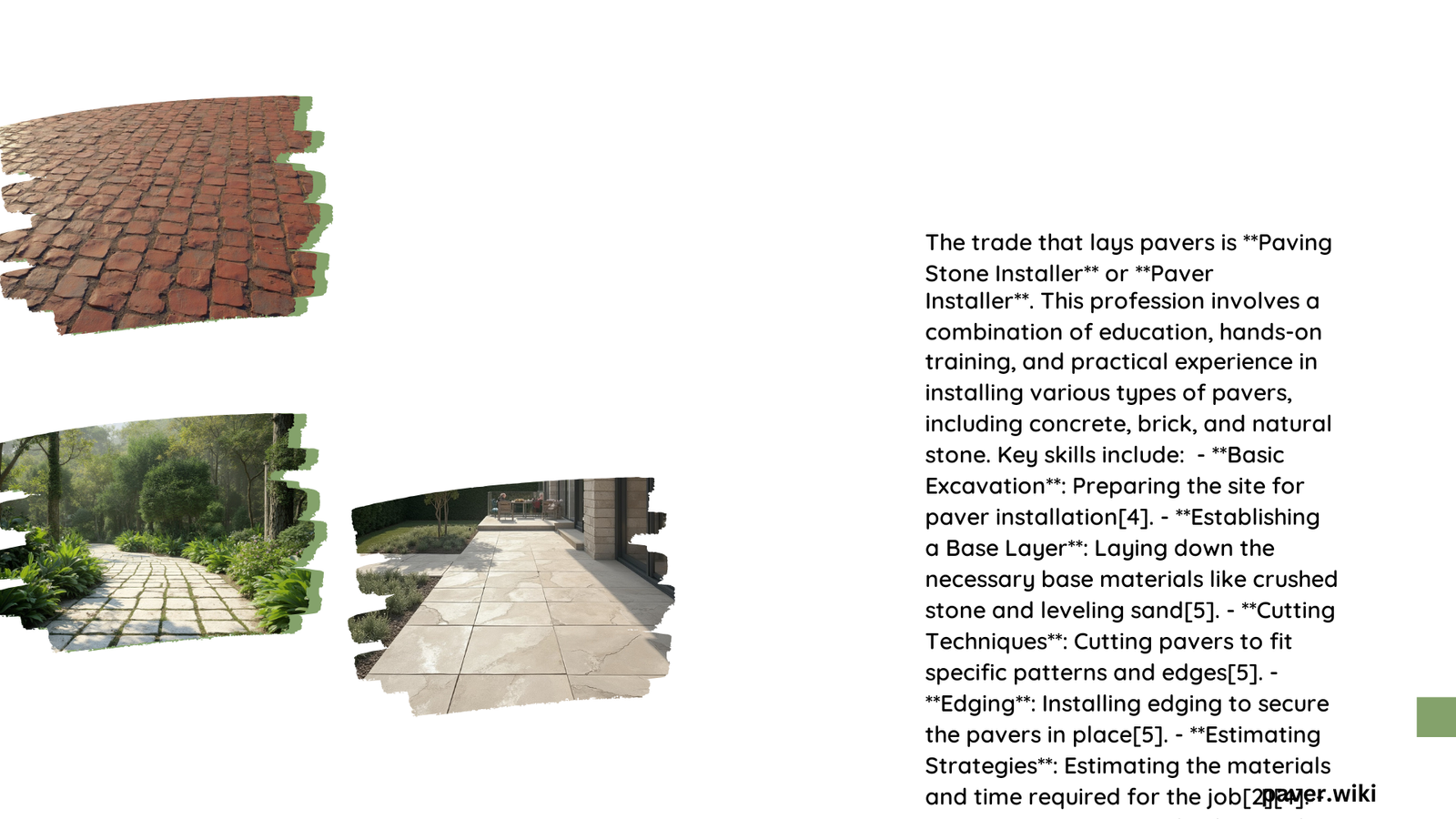The trade of laying pavers involves specialized professionals who prepare surfaces, install various paving materials, and create durable outdoor surfaces. These experts include paver installation contractors, concrete paver specialists, interlocking paver installers, and masonry paver services. Each role requires specific skills, techniques, and knowledge to ensure proper installation and longevity of paved surfaces.
What Are the Main Roles in Paver Installation?
Paver installation involves several key roles, each with distinct responsibilities:
- Paver Installation Contractors
- Concrete Paver Specialists
- Interlocking Paver Installers
- Masonry Paver Services
Let’s explore each of these roles in detail.
What Do Paver Installation Contractors Do?

Paver installation contractors are responsible for:
- Preparing surfaces for paving
- Interpreting blueprints and specifications
- Installing and repairing pavements
- Cutting and shaping paving materials
- Applying finishing touches
What Techniques Do Paver Installation Contractors Use?
- Base Preparation:
- Remove unstable materials
- Compact and grade soil
-
Stabilize weak or saturated soils
-
Drainage Considerations:
- Install edge restraints
-
Use bedding and jointing sand
-
Interlocking Methods:
- Set pavers with correct alignment and spacing
- Sweep sand into joints
- Compact pavement until joints are full
What Are the Costs and Timelines for Paver Installation?
| Material | Cost per Square Foot | Project Timeline |
|---|---|---|
| Asphalt | $2 – $5 | Few days to weeks |
| Concrete Pavers | $10 – $20 | Few days to several weeks |
| Interlocking Pavers | $10 – $25 | Few days to several weeks |
What Are the Responsibilities of Concrete Paver Specialists?
Concrete paver specialists focus on:
- Designing paver installation layout patterns
- Creating markings for joints and stringlines
- Preparing the base with specific materials
- Setting and aligning concrete pavers
- Compacting bedding sand and pavers
What Techniques Do Concrete Paver Specialists Employ?
- Base Preparation (similar to general paver installation)
- Drainage Considerations
- Interlocking Methods (with additional support for concrete pavers)
What Are the Costs and Timelines for Concrete Paver Installation?
- Costs typically range from $10 to $20 per square foot
- Projects can take several days to several weeks
What Do Interlocking Paver Installers Do?
Interlocking paver installers are responsible for:
- Reading blueprints and work order specifications
- Measuring and marking guidelines for installations
- Installing interlocking pavers with correct alignment and spacing
- Sweeping sand into joints and compacting the pavement
What Techniques Do Interlocking Paver Installers Use?
- Base Preparation
- Drainage Considerations
- Interlocking Methods (focusing on patterns that allow for expansion and contraction)
What Are the Costs and Timelines for Interlocking Paver Installation?
- Costs generally range from $10 to $25 per square foot
- Project timelines vary from a few days to several weeks
What Are the Roles of Masonry Paver Services?
Masonry paver services involve:
- Using various materials (bricks, concrete blocks, natural stones)
- Designing paver installation layout patterns
- Creating markings for joints and stringlines
- Cutting paving stones to size using specialized tools
What Techniques Do Masonry Paver Services Employ?
- Base Preparation
- Drainage Considerations
- Interlocking Methods (with additional support for masonry pavers)
What Are the Costs and Timelines for Masonry Paver Installation?
- Costs range from $15 to $30 per square foot
- Projects can take several days to several months for large, intricate designs
What Are the Common Challenges in Paver Installation?
Paver installation professionals face several challenges that can impact accessibility and project outcomes:
- Weather Conditions:
- Reduces work activity
-
Affects installation quality
-
Material Quality:
- Low-quality materials lead to premature wear
-
Impacts durability and aesthetic appeal
-
Drainage Issues:
- Improper drainage causes water accumulation
-
Leads to shifting or uneven pavers
-
Safety Concerns:
- Compliance with safety regulations is crucial
- Prevents accidents and maintains a safe work environment
By understanding these challenges, paver installation professionals can take proactive measures to ensure successful project outcomes and maintain high-quality standards in their work.
References:
1. https://hrblade.com/job-descriptions/paver
2. https://www.myplan.com/careers/segmental-pavers/description-47-4091.00.html
3. https://theasphaltpro.com/articles/paving-job-descriptions/
